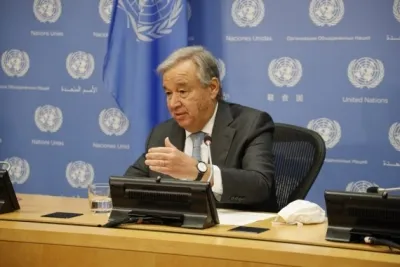Pakistan and Afghanistan Engage in Discussions on Security, Trade, and Deportation during Dar's Visit to Kabul

Synopsis
Key Takeaways
- Mutual agreement to enhance bilateral ties.
- Focus on security and trade concerns.
- Importance of high-level engagements.
- Discussion on border management issues.
- Concerns regarding the TTP and intelligence sharing.
Islamabad, April 19 (NationPress) On Saturday, Pakistan and Afghanistan reached a mutual agreement to enhance their commitment to strengthening bilateral ties and to continue recent engagements aimed at addressing shared concerns in critical areas such as security, connectivity, and trade.
The reaffirmation of this agreement took place during the day-long visit of Pakistan's Deputy Prime Minister and Foreign Minister Ishaq Dar to Kabul. This visit marked the first instance of a high-ranking official from the Pakistan government engaging in discussions following multiple diplomatic encounters between the neighboring countries.
During this visit, Dar held a private meeting with Afghanistan's Acting Foreign Minister Amir Khan Muttaqi, where both parties expressed a desire to reduce tensions and foster bilateral cooperation in various mutually beneficial sectors.
It was agreed that ongoing high-level engagement is essential to tackle significant issues, identify solutions to problems, and collaborate effectively to eliminate misunderstandings.
According to sources, the meeting between Dar and Muttaqi produced positive outcomes as they deliberated on an array of bilateral topics. The focus remained on regional trade, interpersonal connections, and importantly, border management.
Dar stressed the importance of addressing border security issues, particularly the efforts of terrorist organizations attempting to infiltrate into Pakistan. Border management was also highlighted as a pressing concern.
Sources indicated that the Afghan Taliban requested Pakistan to share intelligence about the existence of Tehreek-e-Taliban Pakistan (TTP) safe havens on Afghan soil, promising to take action if Islamabad provides more detailed information.
However, experts suggest that such commitments may be superficial, and the Afghan Taliban may not act against TTP. Tahir Khan, a strategic analyst, expressed doubts, stating, "I do not believe the Afghan Taliban will take any action against TTP, particularly upon Pakistan's request and the intelligence provided. There exists a strong anti-Pakistan sentiment within the Afghan Taliban, who view Islamabad as a US ally against them."
He further noted, "Additionally, the Afghan Taliban would not want to see divisions within their ranks or factions leaving their camps due to actions taken against TTP simply to appease Pakistan."
The discussions also covered the ongoing repatriation of thousands of illegal immigrants and holders of the Afghan Citizen Card (ACC) from Pakistan. Sources mentioned that the Afghan Taliban did not urge Islamabad to halt the process but sought leniency towards Afghan nationals, as reports of abuse and mistreatment of deportees continue to dominate news headlines.










